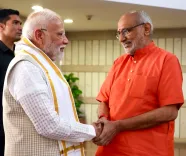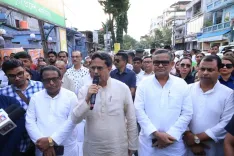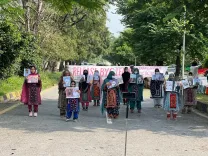How is the Jindal Institute of Haryana Studies Shaping the Sonipat Human Development Report?

Synopsis
Key Takeaways
- Stakeholder Consultation: Engaged various sectors for comprehensive input.
- Focus Areas: Addressed education, health, governance, and more.
- Data-Driven Strategy: Aimed to create a roadmap for sustainable development.
- Inclusive Approach: Emphasized the need for accessible and actionable HDR.
- Collaborative Effort: Highlighted the importance of multi-stakeholder engagement.
On August 27, Sonipat’s path towards inclusive and sustainable development was highlighted during a significant event hosted by the Jindal Institute of Haryana Studies (JIHS) at O.P. Jindal Global University (JGU). This high-level Stakeholder Consultation focused on the upcoming Sonipat Human Development Report (HDR).
The full-day event gathered influential figures from various sectors, including academia, government, civil society, media, and development organizations, to discuss the most urgent issues and unexplored opportunities facing the district.
Topics ranged from education and health to livelihoods, governance, environment, and spatial transformation, laying the groundwork for a data-informed strategy to guide Sonipat’s future.
Led by Professor (Dr) Mrinalini Jha, Director of JIHS, with guidance from Professor (Dr) C. Raj Kumar, Founding Vice Chancellor of JGU, this initiative showcases the institute’s dedication to region-focused research that informs evidence-based policy for Haryana.
Notable participants included Sushil Sarwan (Deputy Commissioner, Sonipat), Udit Misra (The Indian Express), Dr. Dipa Sinha (Azim Premji University), Dr. Pallavi Choudhuri (NCAER), Ritu Mathur (Retd., UNDP India), and several experts from both national and international organizations.
There was a strong emphasis on making the HDR both accessible and actionable, advocating for translation into local languages, user-friendly indices, disaggregated data, and primary surveys that reflect the realities across gender, rural-urban divides, and public-private sectors.
The Sonipat HDR is set to serve as a foundation for the district’s development journey, monitoring progress in maternal and child health, WASH (water, sanitation, and hygiene), pollution, land use, and access to essential services.
More than just a report, it will function as a vital tool for policymakers, practitioners, and citizens, helping to envision and facilitate a more inclusive Sonipat.








